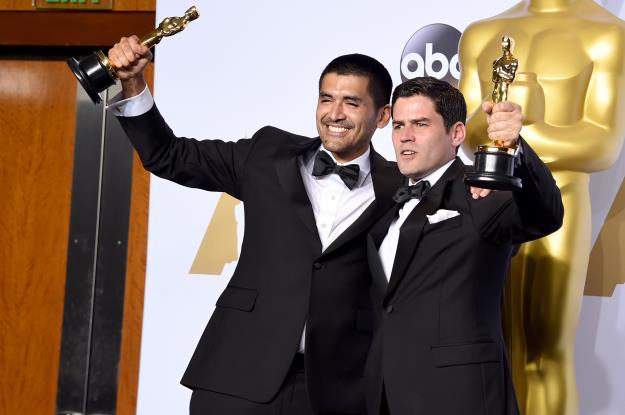When Chile won its first-ever Academy Award on February 28 for the animated short film “Bear Story” (Historia de un Oso), the nation got more than a gold-plated statuette. It was also jolted into confronting the still-taboo subject of forced exiles and political disappearances under the military dictatorship of General Augusto Pinochet.
An estimated 200,000 Chileans fled or were forced into exile during Pinochet’s rule from 1973 to 1990. Among them was the grandfather of film director Gabriel Osorio, who was inspired by those events to create his 10-minute animated film “Bear Story,” a beautiful and melancholy allegory-within-an-allegory about a family ripped apart.
Made over four years on a government-funded budget of just $40,000, “Bear Story” has set off a national conversation in Chile about loss and reconciliation. “It’s a simple story, but profoundly human, that has marked the lives of so many families in our country,” President Michele Bachelet said of the film, which is to be shown at elementary schools around the country.
AQ caught up by phone with Osorio, who accepted the Oscar in Los Angeles just three days after turning 32 years old. “It was the perfect birthday gift,” he said from Santiago, where his film studio Punkrobot is based. The following Q&A has been edited for length and clarity. You can view the full film here, or check out the trailer below.
AQ: How was your family personally affected by the separation of families under Pinochet?
GO: The story was inspired by my grandfather. He was exiled in 1973. I met him when I was 10. It was a big deal for me, because when he came back, the family was torn apart, separated. When he came back he found everything different in the family. He had lost a time and a moment that he never recovered. It happened not just to my grandfather but to a lot of families in Chile. It’s a story that has been with me for a long time. I feel in some ways that making this film was a therapeutic process for me, for my family. It was a very healing process for me personally, but it’s a great to see that it’s been the same process for a lot of people in Chile.
AQ: How is your award changing the political conversation in Chile?
GO: It’s raising a lot of conversations. For a long time in Chile, no one wanted to talk about what happened with the exiles. There was a little taboo about that. And now people are talking about the stories of what happened to their families. I think it’s great for the country. In some way, I like to think that this is helping the memory of the country to heal. Why did we wait so long to talk about this? Why did we have to wait for a short film to win an Oscar to talk about this?
AQ: Why do you think you’ve hit a nerve now?
GO: I think the award put the film in the media, and now everybody is talking about the film. For me as a director, trying to convey this idea, this is the greatest thing that can happen because I can reach that audience, I can reach the people and get the people to think about the importance of family, about what happened with so many people that were separated from their families. The other thing that I feel is important, is that I talk in the film about exiles but in a universal way. It’s not only related to Chile. It’s happening around the world right now, it’s happening in Syria. I think, in some way, I can talk to the new generations and the kids so the same things don’t happen again. That’s my hope. It’s naive. But I like to think I’m putting something in society to make it better.
AQ: How did you first get into film?
GO: Everything started when I was a very little kid. I was always drawing, I always had these sketch books, I always thought since I was a kid that I was going to be a cartoonist. I loved to make cartoons. I loved to draw people and tell stories and make jokes, very simple jokes with pictures, like when kids are in school and they make pictures – that’s what I was doing all the time. So for me, studying fine arts was a very natural step. And then, from oil painting to telling stories, I saw that animation was a really perfect place for me to express my ideas.
AQ: What has your life been like since winning the Oscar?
GO: It’s been a really crazy week. All the newspapers and media in the region, everybody wants a piece of us right now. On WhatsApp, I have like 80 requests for interviews that I haven’t had the time to respond to. It’s crazy. It’s mostly national, but there is lot of Latin American media, like Uruguay, Colombia, Argentina media. And we have invitations to give speeches in Mexico. We are going in April to Argentina. It’s a lot.
AQ: Does it seem like Latin America as a whole has been inspired by your award?
GO: It’s great to receive so much support from our Latin American neighbors. We have received a lot of support and congratulations. I feel that a lot of people in Chile and in South America are feeling more inspired to say that we can accomplish great things. We have maybe smaller budgets. But we have the talent, we have the artists to make this happen.
AQ: How is the filmmaking scene in Chile different from Hollywood?
GO: One thing that is better in some ways with having a smaller budget is that there’s not so much pressure to recover the investment. We can risk more on the story. We can take different approaches and try different things. Be more bold in general. I think that’s a good thing. With less budget comes a lot more freedom and less responsibility on the financial part. At the same time, we have to make the most with this budget, so we have to create solutions for things we cannot afford. We had trouble in that we ran out of money and had to stop production. That was the main problem. We had to extend production over four years, but production itself was only a year-and-a-half of work in the last four years, because we ran out of budget.
AQ: Do you see this Oscar as changing the future of Chilean film?
GO: It’s only been a week and a lot of things are changing. We work with the support of a university – right now they are giving us more space and better equipment. This is a change from day one. And there are opportunities that came with the award: For example, we are in conversations with a producer in Hollywood to make the story as a feature film. We want to make this in a couple years and try not to take so long as the short film.
—
Kurczy is a special correspondent to AQ.








